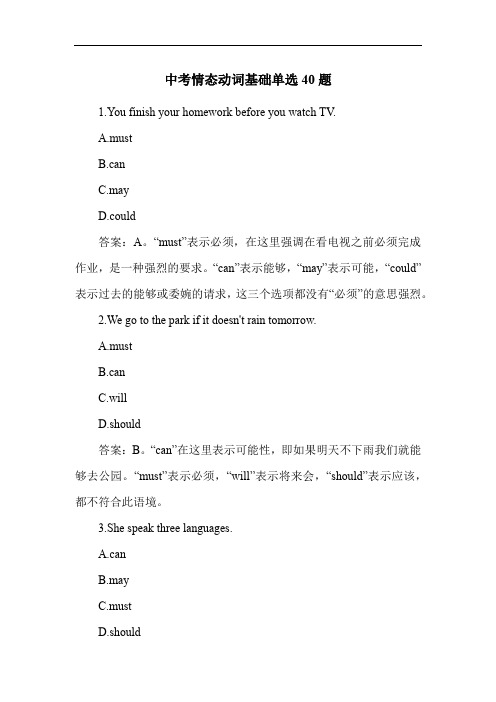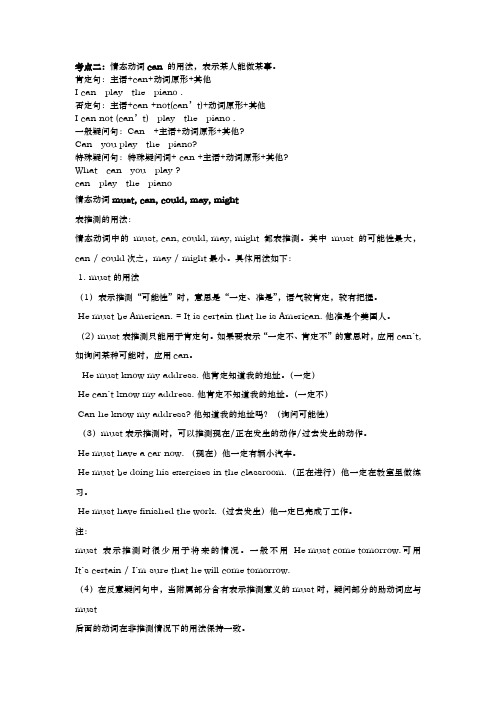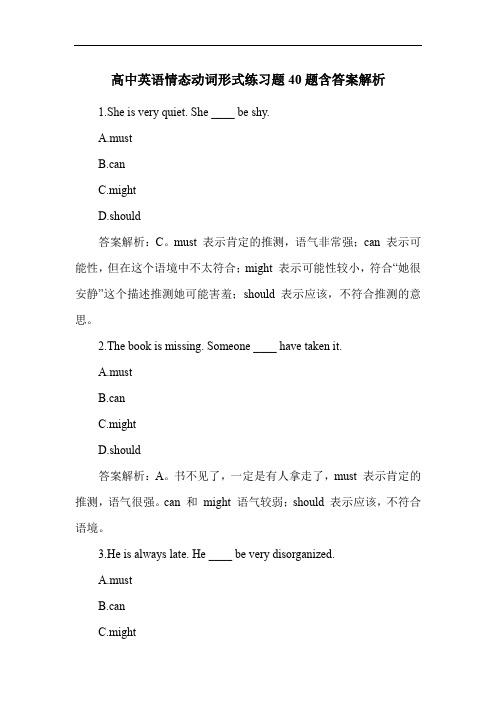情态动词canmaymustneed与练习题
中考情态动词基础单选40题

中考情态动词基础单选40题1.You finish your homework before you watch TV.A.mustB.canC.mayD.could答案:A。
“must”表示必须,在这里强调在看电视之前必须完成作业,是一种强烈的要求。
“can”表示能够,“may”表示可能,“could”表示过去的能够或委婉的请求,这三个选项都没有“必须”的意思强烈。
2.We go to the park if it doesn't rain tomorrow.A.mustB.canC.willD.should答案:B。
“can”在这里表示可能性,即如果明天不下雨我们就能够去公园。
“must”表示必须,“will”表示将来会,“should”表示应该,都不符合此语境。
3.She speak three languages.A.canB.mayC.mustD.should答案:A。
“can”表示能力,她能够说三种语言。
“may”表示可能,“must”表示必须,“should”表示应该,都不能表达她具有说三种语言的能力。
4.You borrow books from the library.A.canB.mustC.shouldD.need答案:A。
“can”表示可以,即你可以从图书馆借书。
“must”表示必须,“should”表示应该,“need”表示需要,都不符合此语境。
5.I be late for school today. I got up late.A.mayB.mustC.canD.should答案:A。
“may”表示可能,因为起晚了所以可能会迟到。
“must”表示必须,“can”表示能够,“should”表示应该,都不太符合此语境。
6.We take an umbrella. It might rain later.A.mustB.canC.shouldD.may答案:C。
“should”在这里表示应该,因为可能会下雨所以应该带伞。
情态动词经典例题

情态动词经典例题一、情态动词单项选择题1.You _______ lose your way if you walk alone in the mountains(山) at night.A.may B.need C.can D.should【答案】A【解析】【详解】句意:如果你晚上一个人在山里走,你可能会迷路。
考查情态动词辨析。
may可能;need需要;can能,会;should应该。
根据“if you walk alone in the mountains(山) at night.”可知,此次是可能会迷路。
may是情态动词表示推测,故选A。
2.—May I have some wine to drink?—No, you ________. You have to drive home later.A.mustn’t B.needn’t C.can’t D.may not【答案】A【解析】【详解】句意:——我可以喝点酒吗?——不,你不能。
你一会儿得开车回家。
考查情态动词。
mustn’t不可以,表禁止;needn’t不需要;can’t不可能;may not可能不是。
上句询问能否喝点酒,结合“drive home”可知,开车不能喝酒,表禁止,故用mustn’t。
故选A。
3.Bill has been driving all day. He ________ be tired.A.need B.must C.shall D.can【答案】B【解析】【详解】句意:Bill已经开了一整天的车了。
他一定累了。
考查情态动词表推测。
need需要;must一定;shall将,会;can能够。
根据“Bill has been driving all day.”可知,Bill一定很累了。
此处用must表示肯定推测。
故选B。
4.—Mr Zhong, why should we have to wash hands so often a day?—For your health, you ________ be too careful.A.needn’t B.shouldn’t C.mustn’t D.can’t【答案】D【解析】【详解】句意:——钟老师,为什么我们一天要洗手这么勤?——为了你的健康,你再怎么小心也不为过。
情态动词canmaymustneed与练习题

考点二:情态动词can 的用法,表示某人能做某事。
肯定句:主语+can+动词原形+其他I can play the piano .否定句:主语+can +not(can’t)+动词原形+其他I can not (can’t) play the piano .一般疑问句:Can +主语+动词原形+其他?Can you play the piano?特殊疑问句:特殊疑问词+ can +主语+动词原形+其他?What can you play ?can play the piano情态动词must, can, could, may, might表推测的用法:情态动词中的must, can, could, may, might都表推测。
其中must的可能性最大,can / could次之,may / might最小。
具体用法如下:1. must的用法(1)表示推测“可能性”时,意思是“一定、准是”,语气较肯定,较有把握。
He must be American. = It is certain that he is American. 他准是个美国人。
(2)must表推测只能用于肯定句。
如果要表示“一定不、肯定不”的意思时,应用can`t,如询问某种可能时,应用can。
He must know my address. 他肯定知道我的地址。
(一定)He can`t know my address. 他肯定不知道我的地址。
(一定不)Can he know my address? 他知道我的地址吗?(询问可能性)(3)must表示推测时,可以推测现在/正在发生的动作/过去发生的动作。
He must have a car now. (现在)他一定有辆小汽车。
He must be doing his exercises in the classroom.(正在进行)他一定在教室里做练习。
He must have finished the work.(过去发生)他一定已完成了工作。
小学英语情态动词知识点及练习

情态动词【知识要点】:情态动词(Modal verbs)本身有一定的词义, 表示语气的单词。
但是不能独立作谓语, 只能和动词原形一起构成谓语。
情态动词用在行为动词前, 表示说话人对这一动作或状态的看法或主观设想。
情态动词虽然数量不多, 但用途广泛, 主要有下列: can (could), may (might), must, need, ought to, dare (dared), shall (should), will (would) must not.情态动词无人称和数的变化, 情态动词后面跟的动词须用原形, 否定式构成是在情态动词后面加 "not"。
疑问形式是将情态动词提至主语前。
个别情态动词有现在式和过去式两种形式, 过去式用来表达更加客气, 委婉的语气, 时态性不强, 可用于过去, 现在或将来。
情态动词属非及物动词, 故没有被动语态。
【典型例题】:【专题一】:can和could的用法【例1】Can you lift this heavy box?(体力)【解析】表示能力(体力、知识、技能)【练习】1.Mary speak three languages.(知识)2... yo.skate?(技能)此时可用be able to代替。
Can只有一般现在时和一般过去式;而be able to 则有更多的时态。
I’ll not be able to come this afternoon.当表示“经过努力才得以做成功某事”时应用be able to,不能用Can。
【例2】-----Can I go now?----.Yes.yo.can..No.yo.can’t.【解析】表示请求和允许。
此时可与may互换。
在疑问句中还可用could,might 代替,不是过去式,只是语气更委婉,不能用于肯定句和答语中。
【练习】---- I come to see you tomorrow?---.Yes.yo.....----No.yo..../I’.afrai.not.【例3】Can this be true?【解析】表示推测(惊讶、怀疑、不相信的态度),用于疑问句、否定句和感叹句中。
高中英语情态动词形式练习题40题含答案解析

高中英语情态动词形式练习题40题含答案解析1.She is very quiet. She ____ be shy.A.mustB.canC.mightD.should答案解析:C。
must 表示肯定的推测,语气非常强;can 表示可能性,但在这个语境中不太符合;might 表示可能性较小,符合“她很安静”这个描述推测她可能害羞;should 表示应该,不符合推测的意思。
2.The book is missing. Someone ____ have taken it.A.mustB.canC.mightD.should答案解析:A。
书不见了,一定是有人拿走了,must 表示肯定的推测,语气很强。
can 和might 语气较弱;should 表示应该,不符合语境。
3.He is always late. He ____ be very disorganized.A.mustB.canC.might答案解析:A。
他总是迟到,肯定是非常没有条理,must 表示肯定的推测,语气强。
can 和might 可能性较小;should 表示应该,不合适。
4.The lights are on. Someone ____ be at home.A.mustB.canC.mightD.should答案解析:A。
灯亮着,肯定有人在家,must 表示肯定的推测,语气强。
can 和might 可能性较小;should 表示应该,不符合语境。
5.The test was very difficult. She ____ have passed it.A.mustB.canC.mightD.should答案解析:C。
考试很难,她可能通过了,might 表示可能性较小。
must 语气太强;can 表示可能性,但不太符合这个语境;should 表示应该,不符合推测的意思。
6.He looks very tired. He ____ have worked hard.A.mustB.canD.should答案解析:A。
初中语法:情态动词知识点练习题

初中语法:情态动词知识点练习题一、情态动词单项选择题1.—Shall I tell him the change of the time right now?—I’m afraid you ________, otherwise he will be late for the meeting.A.can B.may C.must D.need【答案】C【解析】【详解】句意:——我现在就告诉他时间改变了,好吗?——恐怕你必须这么做,否则他开会就要迟到了。
考查情态动词辨析。
can能够,表能力或许可;may可以,表推测;must必须;need需要。
根据下文“otherwise he will be late for the meeting”,可知ABD三项不合语境,这里是说必须告诉他时间改了,故选C。
2.—I went to Mount Wudang last week. But there were too many people and it’s too hot.—It’s too bad. I think your trip ________ be unpleasant.A.c an’t B.should C.must D.need【答案】C【解析】【分析】【详解】句意:——我上周去了武当山。
但是人太多了,天气太热了。
——太糟糕了。
我想你的旅行一定很不愉快。
考查情态动词。
can’t不能;should应该;must一定;need需要。
根据“But there were too many people and it’s too hot.”判断,此次旅行一定是不愉快的,表示肯定的推测,用must be。
故选C。
3.________ you raise yo ur feet off the floor? I’d like to see if my pen is under the desk. A.Must B.Can C.Should D.May【答案】B【解析】【分析】【详解】句意:你可以把脚抬离地面吗?我想看看我的钢笔是否在课桌下面。
情态动词知识点练习
情态动词知识点练习一、情态动词单项选择题1.Listen up, guys! Everyone ________ wear a mask. Go and buy one if you don’t have one. A.can’t B.can C.mustn’t D.must【答案】D【解析】【详解】句意:听着,大家!每个人都必须戴口罩。
如果你没有,就去买一个。
考查情态动词。
can’t不能;can可以;mustn’t禁止;must必须。
根据“Everyone...wear a mask. Go and buy one if you don’t have one.”可知,此处表示必须戴口罩,用must。
故选D。
2.—Do you think Tim will be chosen as the leader of the football team this year?—It ________ be him. He has no sense of teamwork.A.can’t B.mustn’t C.can D.must【答案】A【解析】【分析】【详解】句意:——你认为蒂姆今年会被选为足球队的队长吗?——不可能是他。
他没有团队精神。
考查情态动词。
can’t不可能;mustn’t禁止;can能;must必须。
根据“He has no sense of teamwork.”他没有团队精神,可知蒂姆“不可能”被选为足球队的队长,表示否定推测用can’t,故选A。
3.— _________ you give me some advice about protecting the environment(保护环境)?—Yes, I think it’s important to do garbage sorting(垃圾分类).A.Can B.Must C.May D.Need【答案】A【解析】【详解】句意:——你可以给我一些关于保护环境的建议吗?——是的,我认为做垃圾分类很重要。
情态动词can may must need及练习
考点二:情态动词can 的用法,表示某人能做某事。
肯定句:主语+can+动词原形+其他I can play the piano .否定句:主语+can +not(can’t)+动词原形+其他I can not (can’t) play the piano .一般疑问句:Can +主语+动词原形+其他?Can you play the piano?特殊疑问句:特殊疑问词+ can +主语+动词原形+其他?What can you play ?can play the piano情态动词must, can, could, may, might表推测的用法:情态动词中的must, can, could, may, might都表推测。
其中must的可能性最大,can / could次之,may / might最小。
具体用法如下:1. must的用法(1)表示推测“可能性”时,意思是“一定、准是”,语气较肯定,较有把握。
He must be American. = It is certain that he is American. 他准是个美国人。
(2)must表推测只能用于肯定句。
如果要表示“一定不、肯定不”的意思时,应用can`t,如询问某种可能时,应用can。
He must know my address. 他肯定知道我的地址。
(一定)He can`t know my address. 他肯定不知道我的地址。
(一定不)Can he know my address? 他知道我的地址吗?(询问可能性)(3)must表示推测时,可以推测现在/正在发生的动作/过去发生的动作。
He must have a car now. (现在)他一定有辆小汽车。
He must be doing his exercises in the classroom.(正在进行)他一定在教室里做练习。
He must have finished the work.(过去发生)他一定已完成了工作。
完整版(完整版)情态动词专题(练习题含答案)
完整版(完整版)情态动词专题(练习题含答案)一、选择题1.It’s amazing that the pen ________turn voice into text with few mistakes.A.can B.must C.may D.need2.Don’t cross the road until the traffic lights turn green. A car_______hit you.A.need B.may C.should D.must3.—I must go to school today, ________?—No, you ________.You can go as soon as you get well.A.mustn’t I;needn’t B.needn’t I;needn’tC.mustn’t I;mustn’t D.needn’t I;mustn’t4.—Must the children leave at six tomorrow morning?—No, they _______. They can have more time to get ready for the trip.A.can’t B.needn’t C.mustn’t D.may not5.Our Chemistry teacher always tells us we ________ be too hardworking before the exams. A.mustn’t B.shouldn’t C.needn’t D.can’t6.— Is Lang Lang going to perform at Art Center this Friday?— Yes. It ________ be him. He has been here for three days.A.might B.must C.mustn’t D.may7.Exercise is helpful but it ________ be regular (规律的) exercise.A.must B.may C.can D.need8.You ________ write the report again because spelling mistakes are not allowed at all. A.must B.can C.may D.could9.—Is it really necessary for me to go shopping with a mask on?—I’m afraid you ________ in public. It is not only to protect yourself but also to protect others. A.must B.should C.can D.need10.When you visit a museum, some instructions should ________ and we’d better not ________ them.A.pay attention to; be against B.be paid attention; againstC.be paid attention to; against D.be paid attention to; be against 11.Sorry, smoking is not allowed here. If you ________ , you will be fined according to the rules. A.can B.will C.may D.must12.If you buy your mum an iRobot floor cleaner, she ________ sweep the floor every day. A.can’t B.mustn’t C.needn’t D.shouldn’t 13.Please don't make so much noise. I ________ hear the speaker very well.A.needn't B.can't C.shouldn't D.mustn't14.The boy is very brave.I ________ he ________ the tall tree.A.dare say; dares to climbB.dare to say; dare climbingC.dare saying; dares climbD.dare to say; dares climbed15.When I was young, my father ___________ take me to climb the hill which was not far from our house.A.may B.must C.would D.should 16.—Ready? Let’s get started, Martin.— Swimming? I just ________ get used to it in winter.A.can’t B.needn’t C.mustn’t D.shouldn’t 17.Dr. Zhong Nanshan once said, "To prevent the spread of this disease, we________never be too careful."A.can B.may C.must D.should 18.—Will your mother be at home this Saturday?—Hard to say. She _______go to the countryside to see my grandparents.A.must B.may C.can D.would19.Think twice before making a decision, or you __________ get into trouble.A.may B.can't C.shouldn't D.mustn't 20.—Where is Tom? I am considering ________ him about the result of the exam.—Oh. You ________. He has known it already.A.to tell; can't B.telling; needn't C.tell; mustn't D.told; shouldn't 21.—Seventy dollars for such a dress! You ________ be joking!—I’m serious. It’s made of silk from Hangzhou.A.must B.need C.will D.can22.—What is that young lady’s job?—She ________ be a nurse, I’m not sure.A.must B.may C.need D.would23.We've discussed every detail of this plan and have got everything ready. But still something ________ go wrong. We still have to be very careful.A.must B.should C.would D.may24.Never throw objects from the building. Even a small object ________ cause serious injuries, or death, when dropped from a great height.A.must B.should C.may D.need25.Most young people like shopping online because they ________ spend much time going from shop to shop.A.needn’t B.can’t C.m ustn’t D.shouldn’t 26.— Mum, why do I have to wash hands so many times a day?—You ________ be too careful, for your health.A.can’t B.mustn’t C.may not D.needn’t 27.—Will Jim come to Yangzhou for a holiday?—He ________come and it depends on how much homework he will have.A.may B.should C.must D.need28.—In China, many parents complain that their children have to stay up late to do the homework.—Don’t worry. The government has realized the problem. I’m sure there ________ be good news soon.A.can B.should C.need D.must29.Hurry up, or we ________ miss the beginning of the film.A.should B.must C.may D.have to 30.—Will dad arrive home at 6 o’clock to have dinner with us this evening?— I think he will, but he ________ not. Sometimes he works extra hours.A.can B.must C.need D.may31.A hard-working man ________ become a great scientist, but a great scientist ________ be a hard-working man.A.can’t; can B.may not; must C.can’t; must D.may not; can 32.—Excuse me. I haven’t finished reading the book yet. May I keep it a bit longer?— Sorry, you ________. You must return it on time.A.needn’t B.can’t C.won’t D.shouldn’t 33.For the safety of the passengers, objects like guns ________ be carried on board.A.may not B.needn’t C.might not D.mustn’t 34.—May I have some wine to drink?—No, you ________. You have to drive home later.A.mustn’t B.needn’t C.can’t D.may not35.—________ I see your ID card? We have to check your personal information.—Sure. Here you are.A.May B.Need C.Should D.Must36.You ________ be careful with the camera. It costs!A.can B.will C.should D.may 37.—Who’s singing next door? Is it Miss Wang?—It ________ be her. She’s having the board meeting.A.can’t B.shouldn’t C.mustn’t D.needn’t38.It’s of great importance to protect the environment. Each of us ________ take an active part in it.A.can B.may C.would D.should39.—Do we have to finish this today?—Yes, you ________ . Today is the last day.A.would B.may C.can D.must40.—Is it usually warm in Yancheng in May?—Yes. But it _______ be rather cold sometimes.A.must B.should C.would D.can【参考答案】一、选择题1.A解析:A【详解】句意:神奇的是,这支笔能把声音转换成文字,而且很少出错。
初二下册 unit 3 情态动词 练习测试题 带参考答案
概念引入情态动词有具体的词义,但也同助动词一样,需要与其他词语一起构成句子的谓语,另外情态动词没有人称和数的变化,情态动词后必须跟动词原形。
用法讲解I、常见情态动词的用法一、can的用法:Couldyoudomeafavour?你能帮我个忙吗?—CouldIuseyourpen?我能用一下你的钢笔吗?—Yes,youcan.可以。
三、may的用法:(1)表示请求、许可,比can正式。
例如:MayIborrowyourbike?我可以借你的自行车吗?Youmaygohomenow.现在你可以回家了。
(2)表示推测,谈论可能性,意为“可能,或许”,一般用于肯定句中。
例如:Itmayraintomorrow.明天可能会下雨。
Shemaybeathome.她可能在家呢.(3)may的过去式为might,表示推测时,可能性低于may。
?例如:Heisawayfromschool.Hemightbesick.他离开学校了,可能是他生病了。
(4)表示希望、祈求、祝愿,常可译为“祝愿”。
通常是用may+主+动词。
例如:Mayyouhaveagoodtime.祝你过得愉快。
Mayyoubehappy!祝你幸福!五、need的用法:(1)need表示需要、必须,主要用于否定句和疑问句中,其否定形式为needn’t,意为“没有必要,不必”。
用need提问时,肯定回答为must,否定回答为needn’t或don’thaveto。
?例如:—NeedIstayhereanylonger?我还有必要留在这儿吗?—Yes,youmust.是的。
—No,youneedn’t/don’thaveto.不,你不必。
(2)need还可以作实义动词,此时有人称、数和时态的变化,如果是人作主语,后边多接动词不定式。
例如:Ineedtodoitrightnow.我需要马上做这件事。
Heneedstolearnmoreaboutthegirl.他需要多了解那个女孩。
- 1、下载文档前请自行甄别文档内容的完整性,平台不提供额外的编辑、内容补充、找答案等附加服务。
- 2、"仅部分预览"的文档,不可在线预览部分如存在完整性等问题,可反馈申请退款(可完整预览的文档不适用该条件!)。
- 3、如文档侵犯您的权益,请联系客服反馈,我们会尽快为您处理(人工客服工作时间:9:00-18:30)。
考点二:情态动词can 的用法,表示某人能做某事。
肯定句:主语+can+动词原形+其他I can play the piano .否定句:主语+can +not(can’t)+动词原形+其他I can not (can’t) play the piano .一般疑问句:Can +主语+动词原形+其他?Can you play the piano?特殊疑问句:特殊疑问词+ can +主语+动词原形+其他?What can you play ?can play the piano情态动词must, can, could, may, might表推测的用法:情态动词中的must, can, could, may, might都表推测。
其中must的可能性最大,can / could次之,may / might最小。
具体用法如下:1. must的用法(1)表示推测“可能性”时,意思是“一定、准是”,语气较肯定,较有把握。
He must be American. = It is certain that he is American. 他准是个美国人。
(2)must表推测只能用于肯定句。
如果要表示“一定不、肯定不”的意思时,应用can`t,如询问某种可能时,应用can。
He must know my address. 他肯定知道我的地址。
(一定)He can`t know my address. 他肯定不知道我的地址。
(一定不)Can he know my address? 他知道我的地址吗?(询问可能性)(3)must表示推测时,可以推测现在/正在发生的动作/过去发生的动作。
He must have a car now. (现在)他一定有辆小汽车。
He must be doing his exercises in the classroom.(正在进行)他一定在教室里做练习。
He must have finished the work.(过去发生)他一定已完成了工作。
注:must表示推测时很少用于将来的情况。
一般不用He must come tomorrow.可用It`s certain / I`m sure that he will come tomorrow.(4)在反意疑问句中,当附属部分含有表示推测意义的must时,疑问部分的助动词应与must后面的动词在非推测情况下的用法保持一致。
He must be a worker, isn`t he? (现在)他准时个工人,是吗?It must have rained last night, didn`t it? (过去)昨晚一定下雨了,是不是?You must have learned English for many years, haven`t you? (完成时)你一定学了好多年英语,是吗?2. can / could的用法(1)can表示推测“可能性”时,往往用于否定句或疑问句。
Can`t “一定不”,语气很肯定。
can在疑问句中意思是“会、可能”。
He can`t be at home. = It is impossible that he is at home. 他一定不在家。
(2)can /can`t后可接进行时/完成时,表示对现在发生的动作或过去发生的动作进行推测。
They can`t be reading in the library. 他们一定不在图书馆读书。
He can`t have gone to Shanghai for I saw him a minute ago.他不可能去了上海,我刚才还看见他。
It`s so late. Where can she have gone? 天晚了,她可能去哪儿了呢?(3)在反意疑问句中,当陈述部分含有表示推测意义的can`t时,疑问部分的助动词应与can`t后面的动词在非推测情况下的用法保持一致.He can`t be a teacher, is he? 他不是教师,是吗?She can`t have finished her homework, has she? 她一定没有完成家庭作业,是不是?(4)could可用于表示某事有可能发生或可能是事实。
Don`t eat it. It could be poisonous. 不要吃它,可能有毒。
The plane could be delayed by fog. 飞机可能会因为雾晚点。
(5)could还可以用于表示客气、委婉、礼貌的请求语气。
Excuse me, could you tell me the way to the bus station? Could you help me? (6)couldn`t表示否定推测,表示某事不可能真实,或由于特定事实或环境某事肯定不会发生。
It couldn`t possibly be poison. 这不可能是毒药。
注:有时与形容词的比较级连用强调某人或某物不可能再更多地具有某种属性。
You couldn`t be more wrong. 你真是大错特错。
I couldn`t be happier. 我简直是幸福极了。
3. may和might的用法(1) may, might表示推测“可能性”时,意思是“可能”、“也许”,语气没有must肯定。
He may / might be American. = It is possible that he is American. 他可能是个美国人。
注:might不表示过去时态,只是语气上比may更委婉,表示的可能性更小。
(2)may, might表推测时,可以用于否定句,意思是“可能不、也许不”,但不用于疑问句。
He may / might not be at home. 他也许不在家。
(3)may, might可以推测现在正在发生的动作或过去发生的动作。
He may / might be sleeping now. 现在)他可能正在睡觉。
The boy may / might not be watching TV at home. (现在)这个男孩可能没在家看电视These students may / might have seen the film before.(过去)这些学生以前可能看过这部电影。
(4)may, might还可以推测将来的情况。
I think we should take raincoat with us, it may rain. 我想我们应该带上雨衣,可能要下雨了。
She might not come this afternoon. 她今天下午可能不来了。
Exercises: Complete the sentences using“must”or“can`t”.1. I have tried to call him at the office, but there is no reply. He be at home.2. They have bought a new car. They have a lot of money.3. She is carrying a Japanese newspaper. She be Chinese.4. He goes abroad a lot, He have an important job.5. She is a professor at the university. She be very clever.6. She is acting in a Shakespeare play tomorrow. She be an actress.【随堂练习】一. 选择填空1. I thought you ______like something to read. So I have brought you some book.A. oughtB. mightC. couldD. must2. –That man must be Sarah`s husband.--No, he______ be her husband. She is still single.A. can`tB. mustn`tC. may notD. ought to3. Peter ______come with us tonight, but he isn`t very sure.A. mustB. mayC. canD. will4. –What ______it be?--It______ be a mail box, for it is moving. It______ be a car.A. can; can`t; mustB. can; can; mustC. can; mustn`t; mustD. must; mustn`t; can5. –Look, someone is coming. Guess ______.--Jack. He`s always on time.A. who can it beB. who he mayC. who he can beD. who it can be6. –I saw Mary in the library yesterday.--You______ her. She is still abroad.A. mustn`t seeB. can`t have seenC. mustn`t have seenD. couldn`t see7. David, you_____ play with the valuable bottle, you _____break it.A. won`t; can`tB. mustn`t; mayC. shouldn`t; mustD. can`t; shouldn`t8. Susan refuses to marry Jack now. She _____her mind.A. must changeB. should have changedC. must have changedD. would have changed9. Sue______ come together with us tonight, but she isn`t very sure yet.A. mustB. mayC. needD. will10. Aunt Margaret_____ the rain, otherwise she would have arrived here by now.A. must have missedB. should have missedC. had missedD. might miss1.Who is the man over there? Is it Mr. Wu?— It ________ him, but I am not quite sure.A. may beB. maybeC. isD. must be2.Some people feel sick when they read a book in a car or on a boat.A.must B.should C.may D.need3.---Must I go to medical school and be doctor like you,Dad?--- No, you __________, son. You’re free to make your own decision.A. can’tB. mustn’tC. shouldn’tD. don’t have to考点:考查情态动词辨析。
